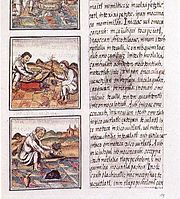Portal:Mesoamerica/Selected article/5

Nahuatl (Nahuatl pronunciation: [ˈnaːwatɬ] ⓘ, with stress on the first syllable) is a group of related languages and dialects of the Nahuan (traditionally called "Aztecan") branch of the Uto-Aztecan language family. Altogether they are spoken by an estimated 1.5 million Nahua people, most of whom live in central Mexico. All Nahuan languages are indigenous to Mesoamerica.
Nahuatl has been spoken in central Mexico since at least the 7th century AD. It was the language of the Aztecs, who dominated what is now central Mexico during the Late Postclassic period of Mesoamerican chronology. During the preceding century and a half, the expansion and influence of the Aztec Empire had led to the variety spoken by the residents of Tenochtitlan becoming a prestige language in Mesoamerica. With the introduction of the Latin alphabet, Nahuatl also became a literary language and many chronicles, grammars, works of poetry, administrative documents and codices were written in the 16th and 17th centuries. This early literary language based on the Tenochtitlan variety has been labeled Classical Nahuatl and is among the most studied and best documented languages of the Americas.
Today Nahuatl varieties are spoken in scattered communities mostly in rural areas. There are considerable differences among varieties, and some are mutually unintelligible. They have all been subject to varying degrees of influence from Spanish. No modern Nahuatl languages are identical to Classical Nahuatl, but those spoken in and around the Valley of Mexico are generally more closely related to it than those on the periphery. Under Mexico's Ley General de Derechos Lingüísticos de los Pueblos Indígenas ("General Law on the Linguistic Rights of Indigenous Peoples") promulgated in 2003, Nahuatl along with the other indigenous languages of Mexico are recognized as lenguas nacionales ("national languages") in the regions where they are spoken, enjoying the same status as Spanish within their region.
